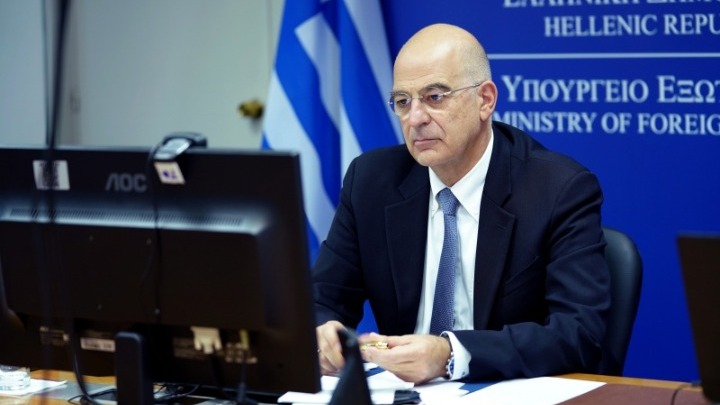Foreign Affairs Minister Nikos Dendias spoke of the necessity of a united front by Greek political forces and society that will allow Greece to face its challenges successfully in the future, in an interview to Action24Press published on Saturday.
“As Greeks, it is necessary to be of the same mind, to have a sense of where the country should head” in terms of future progress, Dendias said. If this happens, “then Greece will have the necessary human resources to face any challenge, regardless of its extent,” otherwise “there will be a great problem,” he said. Along these lines, he noted, the government has tried to create a political climate of national communication and mutual understanding with other parties, by briefing them regularly and explaining the reasons for actions. “This is a model we can convey to society” as well, he said.
Turkey
Dendias spoke also of relations with neighboring Turkey, and of Greece’s foreign policy line not to turn disagreements into personal attacks but to react calmly within the framework of International Law. “We are not an expansionist country, we claim nothing of anyone, we want a European framework, a space of democracy and protection of human rights,” he explained, adding that respecting human beings is the optimal for Greek society. He expressed the hope that one day Turkish society would also reach the same conclusion.
Commenting on the so-called Turkish-Libyan marine zone memorandum, which he said was without legal merit, the Greek FM noted that it signaled a great threat for Greece to be cut off from the sea. The event led to a change in foreign policy, a maturation point shared to a degree by Greek society. This realization led to the understanding that Greece had to develop a more complex way of dealing with issues, beyond the simplistic “I disagree with Turkey” and “I am right, and the international community will award me my rights.”
Dendias reiterated Greece’s support of an independent European defense force. Greek society should have the confidence that Greece can defend its sovereignty on its own, if necessary, without this meaning it will not also be expanding its network of alliances as widely as possible.
Among other issues he raised, Dendias said that it would be difficult for Russia to overturn the climate it has created and convince smaller countries around it that it does not threaten them, and he expressed little hope of the current leadership making such an effort.
Western Balkans
He also spoke of the efforts by the Foreign Affairs Ministry to promote investments, “trying to introduce as many good foreign practices as possible, and to bring the country in contact with investment destinations.” He cited the economic relations Greece has built with Israel and the United Arab Emirates as examples, saying that “All these are important results of a policy that sees beyong the narrow zone of ‘Turkey’ or ‘North Macedonia’ or ‘Albania’.”
In terms of the Western Balkans, he said that incorporating the region safely into the European Union is in Greece’s long-term interest, despite the challenges of bringing the countries of the region within the European framework. Greek society’s historic mission is to help these countries become part of Europe, he underlined, and Greece must focus on the greater picture at large rather than on smaller disagreements. These countries will find it challenging to build up their economies, democracy, and institutions outside the EU, Dendias noted.
Greece’s foreign policy must be extensive and work at several levels, one of which should be the protection of the environment and the marine environment in particular, Dendias said, referring to Greece’s hosting of “Our Ocean Conference,” a US initiative, that serves both the seas of the planet and Greece’s national interests by providing a framework of protecting the open seas.
SOURCE; ANA-MPA









